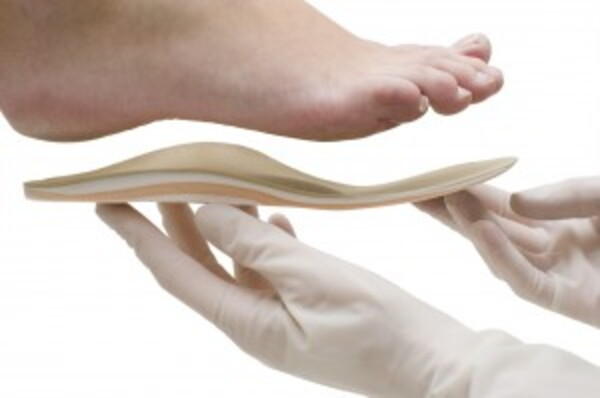Custom Orthotic Devices | Shoe Inserts | Ankle-foot orthosis in Allentown

Your podiatrist at PA Foot and Ankle Associates may recommend custom designed orthotics to manage your foot condition. Orthotics are one of the most effective non-surgical treatments to alleviate pain and fatigue in the foot, ankle, and lower leg, and are very effective in treating heel pain.
Those who suffer with pain or discomfort from plantar fasciitis, obesity, foot deformities, bunions, achilles tendinitis, traumatic injuries, flat feet, diabetic peripheral neuropathy, diabetic foot ulcers, arthritis, and many other conditions can benefit greatly from these in-shoe corrective devices.
Custom orthotic devices do not actually correct foot or ankle problems. They are intended to distribute pressure and align the foot, ankle and lower leg to optimize biomechanical function and reduce the chance of injury. They are used to relieve pain, take weight off painful areas, limit or aid movement, aid in rehabilitation, correct balance problems, and improve the overall function of the foot, ankle, and lower leg.
Custom orthotics for athletes
Many athletes wear custom designed orthotics to improve their performance or endurance and protect their feet from overuse injuries like plantar fasciitis, sesamoiditis, achilles tendinitis, and turf toe. They may also be used to protect the foot while rehabbing from sprains, fractures, and other injuries.
Playing sports puts many demands on the foot and ankle: twisting, rotating, sudden changes in direction, stopping, starting, pressure on the feet. Slight imbalances in the foot or ankle which go unnoticed can make an athlete more prone to injury when active. By eliminating the need for the muscles to compensate for these imbalances, orthotics can reduce fatigue and promote efficient muscle function to enhance performance.
In older adults, orthotics are particularly effective in relieving the foot fatigue and discomfort that accompanies arthritis. They may also be used in conjunction with orthopedic footwear to prevent foot ulcers in diabetics, or prescribed for children who have a foot deformity (see our page on pediatric foot and ankle care).
Custom designed orthotic devices like those prescribed by PA Foot and Ankle Associates should not be confused with over the counter insoles sold at pharmacies, shoe stores, skate shops, running stores, or even our online store. Over the counter inserts are mass produced and designed to fit the average foot, not your foot. They provide some cushioning and support, but aren’t designed to address your specific foot problem.
Custom designed inserts are a very different type of insole. They are molded to conform to the very unique contours of your feet and are specifically designed to correct your injury or condition, balance the foot in a neutral position, and provide a cushion. Your podiatrist will advise you if an off-the-shelf or custom designed insert is the most appropriate choice for your condition.
How custom orthotics are made
Years ago, a patient’s foot was molded in plaster and the mold sent away to an orthotics lab to create the insert. This method worked well, but was occasionally prone to imperfections resulting from the plaster.
At PA Foot and Ankle Associates, we digitally scan your foot to create a 3D model from which the orthotic is made. This digital mapping creates a very precise image to guarantee an exact fit and allow for minute adjustments. Depending on your foot condition, the insert may be made of hard, rigid material such as plastic or carbon fiber, soft material to cushion your feet, or a combination of the two.
Ankle-foot orthosis (AFO)
An ankle-foot orthosis is an orthotic device or brace that surrounds the ankle and at least part of the foot. AFOs are designed to control position and motion of the ankle, compensate for weakness, or correct deformities.
AFOs are most commonly used in the treatment of disorders affecting muscle function like that caused by stroke, spinal cord injury, muscular dystrophy, cerebral palsy, polio, multiple sclerosis and diabetic peripheral neuropathy. They may be used to support weak limbs, position a limb into a normal position, or immobilize the ankle and lower leg in the presence of arthritis or fracture.
Does insurance cover custom orthotics?
Most insurance plans cover at least a portion of the cost of custom orthotics. Please check with your insurance company or call our office to see what portion of the cost may be your responsibility.


